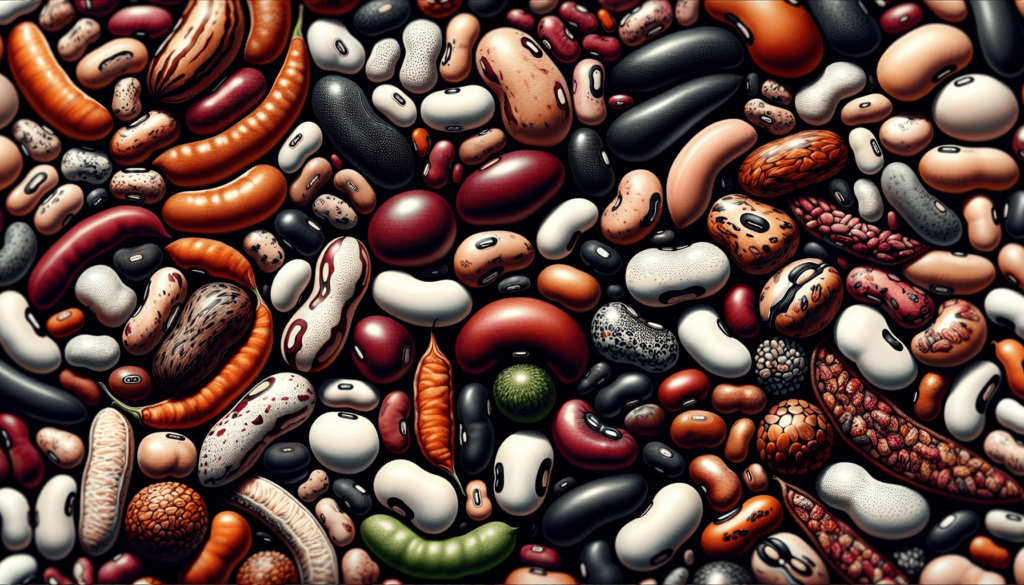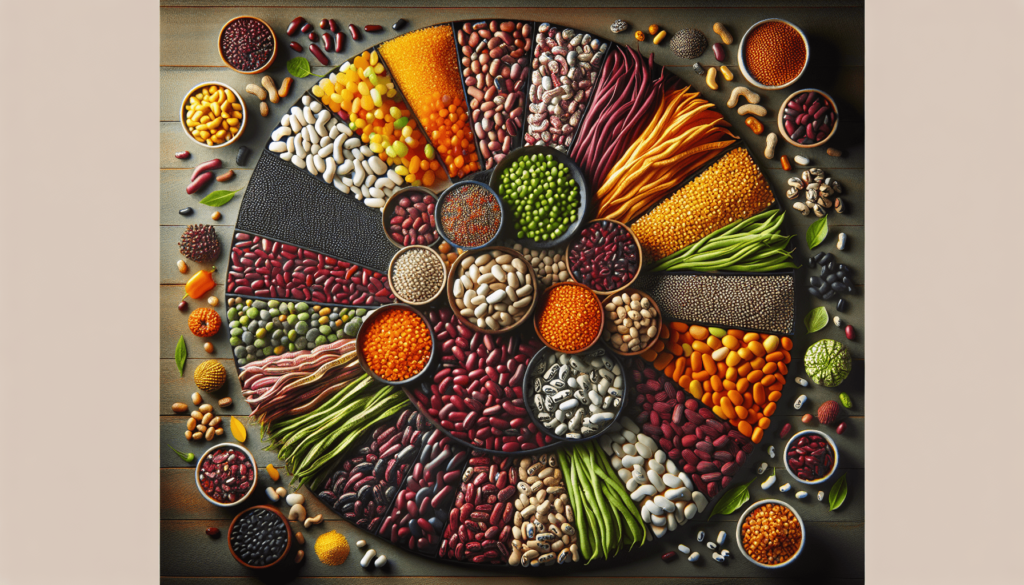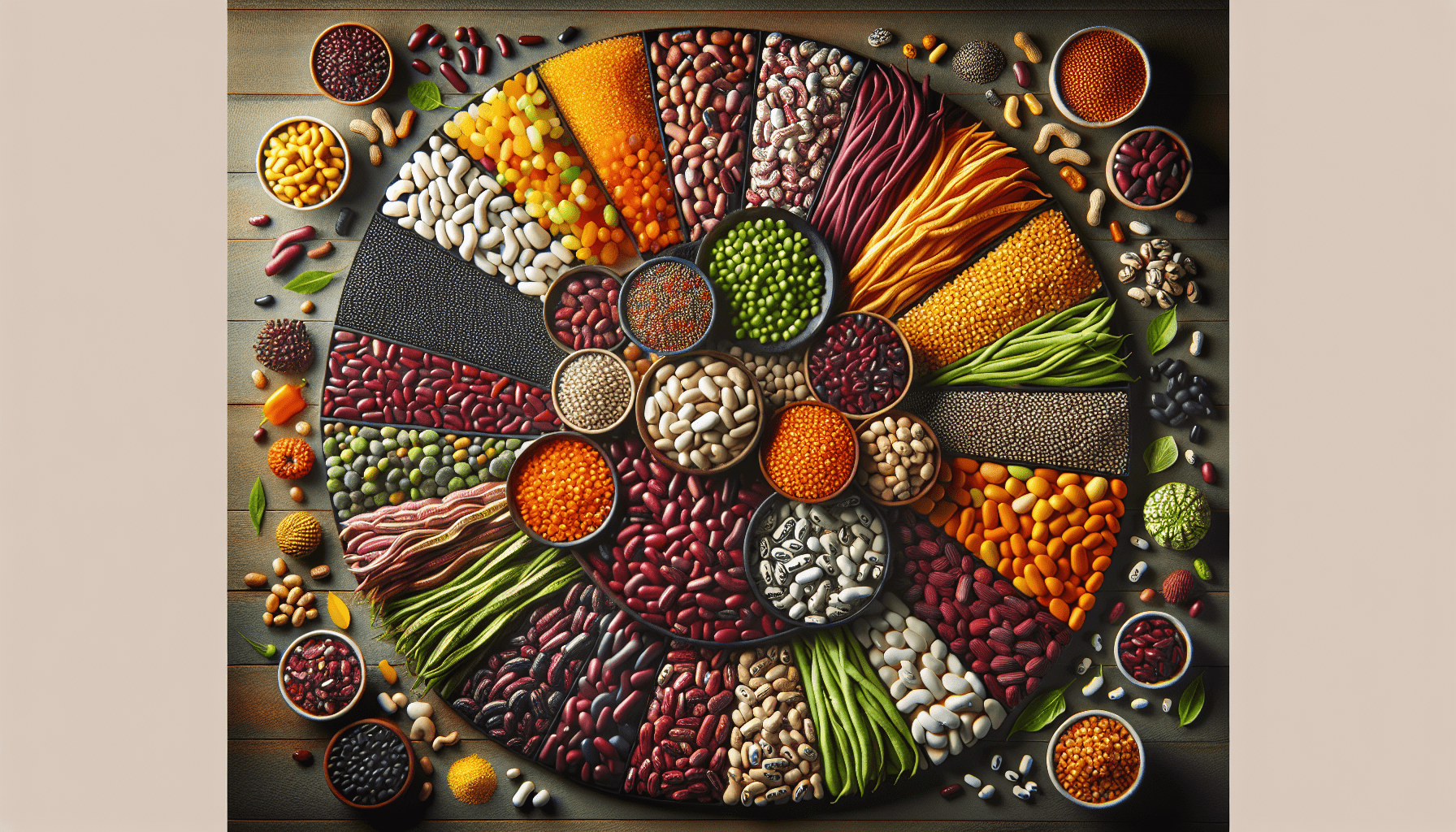Do you ever find yourself wondering if beans can truly fulfill your daily fiber needs and contribute to a healthy diet? In this article, we will explore the nutritional benefits of beans and determine if they are indeed a reliable source of fiber. So, if you’re looking to increase your fiber intake or simply curious about the role beans play in your overall health, keep reading to discover the truth behind their fiber content.

What is fiber and why is it important?
Definition of fiber
Fiber, also known as dietary fiber or roughage, is a type of carbohydrate that cannot be digested by the human body. It is derived from the cell walls of plants and is primarily found in fruits, vegetables, whole grains, and legumes. Unlike other carbohydrates, fiber passes through the digestive system relatively intact, providing numerous health benefits along the way.
Different types of fiber
There are two main types of fiber: soluble and insoluble. Soluble fiber dissolves in water and forms a gel-like substance in the digestive tract. It can help lower cholesterol levels and stabilize blood sugar levels. Insoluble fiber, on the other hand, does not dissolve in water. It adds bulk to the stool, promoting regular bowel movements and preventing constipation. Both types of fiber are essential for maintaining a healthy digestive system and overall well-being.
Benefits of fiber in the diet
Including an adequate amount of fiber in your diet offers a multitude of benefits for your health. Firstly, fiber aids in promoting a healthy digestive system by preventing constipation and maintaining regular bowel movements. It helps to soften and bulk up the stool, making it easier to pass through the intestines. Moreover, a high-fiber diet is linked to a reduced risk of developing various digestive disorders, including hemorrhoids, diverticulitis, and colorectal cancer.
Additionally, fiber plays a crucial role in the management and prevention of chronic diseases such as heart disease, diabetes, and obesity. Soluble fiber helps lower cholesterol levels by binding to cholesterol in the digestive system and preventing its absorption into the bloodstream. This, in turn, reduces the risk of developing heart disease and helps to maintain healthy blood pressure levels. Moreover, a high-fiber diet assists in regulating blood sugar levels by slowing down the absorption of glucose, making it especially beneficial for individuals with diabetes or those at risk of developing the condition.
Furthermore, fiber contributes to weight management by promoting feelings of fullness and reducing overall calorie intake. High-fiber foods tend to be more filling, causing you to eat less and control portion sizes. This can be particularly beneficial for individuals looking to maintain or lose weight. Lastly, a diet rich in fiber is also associated with a reduced risk of certain types of cancer, such as colon cancer.
Recommended daily fiber intake
Overview of recommended fiber intake
According to the Dietary Guidelines for Americans, the recommended daily fiber intake is 25 grams for women and 38 grams for men. However, research suggests that the majority of individuals fail to meet these recommendations, with average fiber intake falling far below the recommended levels. It is therefore important to be mindful of your fiber intake and make conscious efforts to incorporate fiber-rich foods into your daily diet.
Differences in fiber requirements for men and women
The difference in fiber requirements for men and women is primarily due to physiological and metabolic factors. Men generally have a higher calorie intake and a larger body mass compared to women, which necessitates a higher daily fiber intake. Moreover, some studies suggest that women may have a greater sensitivity to the effects of fiber due to hormonal differences. Nevertheless, both men and women can benefit from consuming adequate amounts of fiber as part of a balanced diet.
Factors influencing individual fiber needs
While the general recommendations for fiber intake are a good starting point, it is important to consider individual factors that may influence your specific fiber needs. These include age, activity level, overall health, and specific health conditions. For example, pregnant or breastfeeding women may require higher levels of fiber to support their increased nutrient needs. Individuals with certain digestive disorders, such as irritable bowel syndrome (IBS), may benefit from adjusting their fiber intake based on their symptoms and tolerance levels. It is always best to consult with a healthcare professional or registered dietitian to determine the optimal fiber intake for your unique circumstances.
Nutritional profile of beans
Fiber content in different types of beans
Beans are a fantastic source of dietary fiber. They are known for their high fiber content, with variations across different types of beans. On average, one cup of cooked beans provides around 15 grams of fiber, which is a significant contribution towards meeting your daily fiber needs. Some specific beans that are exceptionally high in fiber include black beans, chickpeas, lentils, and kidney beans.
Comparison of fiber content to other high-fiber foods
When compared to other high-fiber foods, beans stand out as a notable source of fiber. For instance, one cup of cooked brown rice contains about 3.5 grams of fiber, while a medium-sized apple provides approximately 4 grams of fiber. Therefore, incorporating beans into your diet can significantly increase your fiber intake and ensure you are meeting the recommended daily guidelines. Additionally, beans offer a diverse range of flavors and textures, making them a versatile ingredient for various recipes.
Additional nutrients provided by beans
Not only are beans high in fiber, but they also offer numerous other essential nutrients. They are an excellent source of plant-based protein, making them a valuable option for individuals following vegetarian or vegan diets. Beans are rich in minerals such as iron, magnesium, and potassium, which play vital roles in supporting overall health and well-being. Furthermore, beans are low in saturated fat and cholesterol, making them a heart-healthy choice. They are also an abundant source of antioxidants, which help protect the body against cell damage and reduce the risk of chronic diseases.
Health benefits of consuming beans
Role of beans in maintaining digestive health
Consuming beans on a regular basis can have a positive impact on digestive health. The high fiber content in beans promotes regular bowel movements, reducing the risk of constipation and promoting overall gut health. Additionally, the soluble fiber found in beans acts as a prebiotic, providing nourishment to the beneficial bacteria in the gut. This helps to maintain a healthy balance of gut flora, supporting optimal digestion and nutrient absorption.
Impact of beans on cholesterol levels
Research has shown that incorporating beans into your diet can help lower cholesterol levels. The soluble fiber present in beans binds to cholesterol in the digestive system, preventing its absorption into the bloodstream. As a result, this can help reduce LDL (bad) cholesterol levels, which play a significant role in the development of heart disease. Including beans as part of a cholesterol-lowering diet can be an effective strategy for maintaining heart health.
Effect of beans on blood sugar regulation
Beans have a low glycemic index, meaning they cause a slower and more gradual rise in blood sugar levels compared to high-glycemic foods. This is beneficial for individuals with diabetes or those seeking to stabilize their blood sugar levels. The high fiber content in beans slows down the digestion and absorption of carbohydrates, preventing spikes and crashes in blood glucose levels. As a result, incorporating beans into meals can aid in blood sugar regulation and promote better glycemic control.

Incorporating beans into a balanced diet
Tips for including beans in meals and snacks
Incorporating beans into your diet can be easy and delicious. Here are some tips for including beans in your meals and snacks:
- Add cooked beans to salads for an extra boost of fiber and protein.
- Use beans as a meat substitute in dishes like chili, tacos, or stir-fries.
- Blend cooked beans into dips or spreads, such as hummus or bean-based guacamole.
- Make a bean-based soup or stew for a hearty and nutritious meal.
- Roast chickpeas or other beans for a crunchy and protein-packed snack.
Recipes and meal ideas featuring beans
Here are some recipe ideas that showcase the versatility of beans:
-
Black Bean and Corn Salad: Combine cooked black beans, corn, diced tomatoes, red onion, and avocado. Dress with lime juice, olive oil, and fresh cilantro for a refreshing and filling salad.
-
Chickpea Curry: Sauté onions, garlic, and spices like cumin, turmeric, and curry powder. Add cooked chickpeas, coconut milk, and vegetables of your choice. Simmer until the flavors meld together and serve with rice or naan bread.
-
Lentil Soup: In a pot, sauté onions, carrots, and celery until softened. Add vegetable broth, cooked lentils, diced tomatoes, and your favorite herbs and spices. Simmer until the flavors meld together, and enjoy a comforting bowl of lentil soup.
-
Bean and Veggie Tacos: Sauté a medley of bell peppers, onions, and zucchini. Add cooked pinto beans, cumin, chili powder, and a splash of lime juice. Serve the mixture in warm tortillas with toppings like salsa, avocado, and cilantro.
Combining beans with other fiber-rich foods
To further enhance your fiber intake, consider combining beans with other fiber-rich foods. Pairing beans with whole grains, such as brown rice or quinoa, creates a complete protein source while providing a substantial amount of fiber. Additionally, incorporating a variety of fruits and vegetables into your meals can increase your overall fiber consumption. Greens like spinach and kale, fruits like raspberries and pears, and whole grains are all excellent sources of fiber that complement the nutritional benefits of beans.
Potential drawbacks of relying solely on beans for fiber
Limited variety in nutrients
While beans are a fantastic source of fiber, relying solely on them for your fiber intake may limit the variety of nutrients in your diet. A well-balanced diet should include a wide range of foods to ensure you receive an adequate intake of vitamins, minerals, and other essential nutrients. It is important to incorporate a diverse selection of fiber-rich foods, such as fruits, vegetables, whole grains, and nuts, to ensure you are meeting your nutritional needs.
Gas and bloating issues
Beans contain complex carbohydrates that can be difficult for some individuals to digest fully. This may lead to gas, bloating, or gastrointestinal discomfort. However, there are ways to minimize these issues. Soaking dried beans overnight, rinsing canned beans well, and gradually increasing your intake of beans can help reduce the likelihood of experiencing digestive discomfort. Moreover, cooking beans thoroughly and including spices like cumin or fennel can aid in digestion and reduce gas production.
Addressing potential allergic reactions
Although rare, some individuals may experience allergic reactions to beans. Allergies to legumes, including beans, are more commonly seen in individuals who are also allergic to peanuts. Symptoms of a bean allergy may include hives, itching, swelling, difficulty breathing, or gastrointestinal distress. If you suspect an allergy to beans, it is essential to consult a healthcare professional for a proper diagnosis. They can conduct tests and advise you on appropriate dietary modifications to ensure your nutritional needs are met.
Considerations for specific dietary needs
Beans as a fiber source for vegetarians and vegans
Beans are a fantastic source of fiber for individuals following vegetarian or vegan diets. As plant-based protein sources, beans provide a substantial amount of dietary fiber while also supplying much-needed protein. Additionally, beans offer a great alternative to meat or animal products, adding variety and nutritional value to vegetarian and vegan meals. Incorporating a variety of beans into your diet can ensure you receive the necessary fiber and protein to maintain optimal health.
Beans for individuals with gluten intolerance
For individuals with gluten intolerance or celiac disease, beans can be a valuable source of fiber that is naturally gluten-free. They offer a nutritious and versatile option for those following a gluten-free diet, as they do not contain wheat, barley, or rye, which are common sources of gluten. Beans can be used as a substitute for grains in dishes, providing both fiber and protein without the risk of gluten exposure.
Beans in low-carb or ketogenic diets
While beans are generally not recommended for low-carb or ketogenic diets due to their higher carbohydrate content, they can still be incorporated strategically. In small portions, beans can provide a good source of fiber while adding flavor, texture, and plant-based protein to low-carb meals. If you follow a low-carb or ketogenic diet, it is important to monitor your carbohydrate intake and consider consulting with a healthcare professional or registered dietitian to determine how to fit beans into your specific dietary plan.
Expert opinions on beans and fiber intake
Views of nutritionists and dietitians
Nutritionists and dietitians consistently emphasize the importance of fiber in a healthy diet. They recommend incorporating fiber-rich foods, including beans, into meals and snacks to ensure sufficient fiber intake. Beans are often recommended as a sustainable and cost-effective source of fiber, with the added benefit of providing various nutrients and aiding in weight management. However, it is important to note that individual nutritional needs can vary, and it is best to consult with a healthcare professional or registered dietitian for personal dietary advice.
Scientific studies on the relationship between beans and fiber
Scientific studies have consistently demonstrated the positive impact of beans and fiber on overall health. Research has shown that high dietary fiber intake, often achieved through regular consumption of beans, is associated with a reduced risk of developing chronic diseases such as heart disease, type 2 diabetes, and certain types of cancer. Fiber has also been found to aid in weight management by promoting feelings of fullness and reducing calorie intake. These studies highlight the importance of incorporating beans and fiber into a well-rounded diet for optimal health outcomes.
Conclusion
In conclusion, fiber is an essential component of a healthy diet, offering numerous benefits for your overall well-being. Beans, with their high fiber content and diverse nutritional profile, are an excellent addition to any balanced diet. They support digestive health, help lower cholesterol levels, and aid in blood sugar regulation. By incorporating beans into your meals and snacks, you can enjoy their many health benefits while increasing your overall fiber intake. However, it is important to consider individual dietary needs and consult with a healthcare professional or registered dietitian for personalized advice.
Additional resources for further information
For further information on beans and fiber, consider exploring the following resources:
-
Books:
- “Fiber Fueled” by Will Bulsiewicz, MD
- “The Fiber Prescription” by Ranjana Srivastava
-
Websites:
- Mayo Clinic – Fiber: How to Increase the Amount in Your Diet
- American Heart Association – Whole Grains and Fiber
- National Institute of Diabetes and Digestive and Kidney Diseases – Get the Facts: Fiber
-
Articles:
- The Role of Dietary Fiber in the Microbiota-Gut-Brain Axis
- Effects of Dietary Fiber and Its Components on Metabolic Health
- The Effects of Beans on Human Health: A Review

